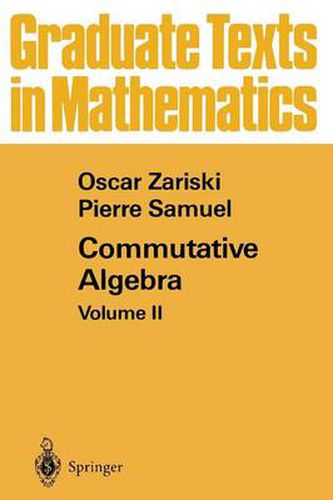Readings Newsletter
Become a Readings Member to make your shopping experience even easier.
Sign in or sign up for free!
You’re not far away from qualifying for FREE standard shipping within Australia
You’ve qualified for FREE standard shipping within Australia
The cart is loading…






This title is printed to order. This book may have been self-published. If so, we cannot guarantee the quality of the content. In the main most books will have gone through the editing process however some may not. We therefore suggest that you be aware of this before ordering this book. If in doubt check either the author or publisher’s details as we are unable to accept any returns unless they are faulty. Please contact us if you have any questions.
This second volume of our treatise on commutative algebra deals largely with three basic topics, which go beyond the more or less classical material of volume I and are on the whole of a more advanced nature and a more recent vintage. These topics are: (a) valuation theory; (b) theory of polynomial and power series rings (including generalizations to graded rings and modules); © local algebra. Because most of these topics have either their source or their best motivation in algebraic geom etry, the algebro-geometric connections and applications of the purely algebraic material are constantly stressed and abundantly scattered through out the exposition. Thus, this volume can be used in part as an introduc tion to some basic concepts and the arithmetic foundations of algebraic geometry. The reader who is not immediately concerned with geometric applications may omit the algebro-geometric material in a first reading (see Instructions to the reader, page vii), but it is only fair to say that many a reader will find it more instructive to find out immediately what is the geometric motivation behind the purely algebraic material of this volume. The first 8 sections of Chapter VI (including 5bis) deal directly with properties of places, rather than with those of the valuation associated with a place. These, therefore, are properties of valuations in which the value group of the valuation is not involved.
$9.00 standard shipping within Australia
FREE standard shipping within Australia for orders over $100.00
Express & International shipping calculated at checkout
This title is printed to order. This book may have been self-published. If so, we cannot guarantee the quality of the content. In the main most books will have gone through the editing process however some may not. We therefore suggest that you be aware of this before ordering this book. If in doubt check either the author or publisher’s details as we are unable to accept any returns unless they are faulty. Please contact us if you have any questions.
This second volume of our treatise on commutative algebra deals largely with three basic topics, which go beyond the more or less classical material of volume I and are on the whole of a more advanced nature and a more recent vintage. These topics are: (a) valuation theory; (b) theory of polynomial and power series rings (including generalizations to graded rings and modules); © local algebra. Because most of these topics have either their source or their best motivation in algebraic geom etry, the algebro-geometric connections and applications of the purely algebraic material are constantly stressed and abundantly scattered through out the exposition. Thus, this volume can be used in part as an introduc tion to some basic concepts and the arithmetic foundations of algebraic geometry. The reader who is not immediately concerned with geometric applications may omit the algebro-geometric material in a first reading (see Instructions to the reader, page vii), but it is only fair to say that many a reader will find it more instructive to find out immediately what is the geometric motivation behind the purely algebraic material of this volume. The first 8 sections of Chapter VI (including 5bis) deal directly with properties of places, rather than with those of the valuation associated with a place. These, therefore, are properties of valuations in which the value group of the valuation is not involved.